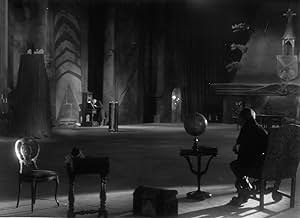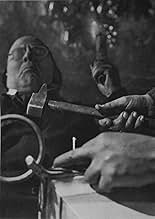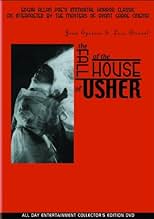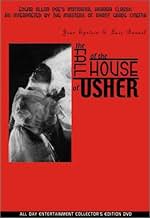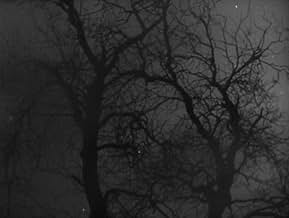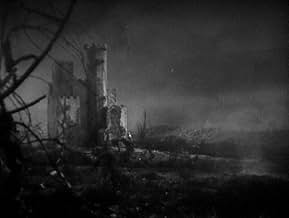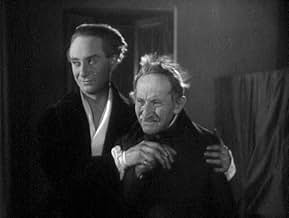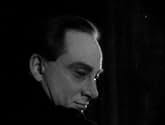IMDb-BEWERTUNG
7,2/10
4862
IHRE BEWERTUNG
Füge eine Handlung in deiner Sprache hinzuAllan visits the sinister Usher family mansion, where his friend Roderick is painting a portrait of his sickly wife Madeline. The portrait seems to be draining the life out of Madeline, slow... Alles lesenAllan visits the sinister Usher family mansion, where his friend Roderick is painting a portrait of his sickly wife Madeline. The portrait seems to be draining the life out of Madeline, slowly leading to her death.Allan visits the sinister Usher family mansion, where his friend Roderick is painting a portrait of his sickly wife Madeline. The portrait seems to be draining the life out of Madeline, slowly leading to her death.
- Regie
- Drehbuch
- Hauptbesetzung
Empfohlene Bewertungen
Predictably morbid and grim, this early cinematic tribute to Poe offers some interesting images and beautifully haunting music. I liked the sequence showing the lace-draped coffin, as it was carried out of that cavernous room.
More stylistic than substantive, the overall effect of the film is to engender a sense of suffocating gloom, rather than to tell an interesting story. It's very much like what one would expect in a nightmare. Space seems strung-out. People are not quite real. Pacing is so slow as to render time suspended between two swings of the clock pendulum.
I don't recall a film that conveyed such an overwhelming sense of introverted bleakness, oppression, and ubiquitous death. Even the trees were dead.
A lot of viewers will find this film lifeless ... so to speak. But for those interested in the antiquity of the occult, or Poe in particular, this film will excite like no other.
More stylistic than substantive, the overall effect of the film is to engender a sense of suffocating gloom, rather than to tell an interesting story. It's very much like what one would expect in a nightmare. Space seems strung-out. People are not quite real. Pacing is so slow as to render time suspended between two swings of the clock pendulum.
I don't recall a film that conveyed such an overwhelming sense of introverted bleakness, oppression, and ubiquitous death. Even the trees were dead.
A lot of viewers will find this film lifeless ... so to speak. But for those interested in the antiquity of the occult, or Poe in particular, this film will excite like no other.
I've read the Poe source for this film more times than I can remember, and Epstein's film captures that story's sense of decay and degeneracy the best by far. Corman's version can't hold a candle to this film; in fact, I feel as if I'm doing a grave disservice to Epstein's work by mentioning Corman's film in the same sentence with it. Let it pass.
Although I'd read about Epstein's USHER for many years and pondered the stills, particularly of the Lady Madeline in her billowing, winding sheet, I was not at all prepared for the terrifying beauty and hypnotic delirium of this motion picture.
It's certainly not for all tastes, and, for those not particularly well-read in outre or occult literature, it will be inscrutable. But for those with an open mind and an appreciation of convulsive beauty, it's hard to find a more exquisite film.
Although I'd read about Epstein's USHER for many years and pondered the stills, particularly of the Lady Madeline in her billowing, winding sheet, I was not at all prepared for the terrifying beauty and hypnotic delirium of this motion picture.
It's certainly not for all tastes, and, for those not particularly well-read in outre or occult literature, it will be inscrutable. But for those with an open mind and an appreciation of convulsive beauty, it's hard to find a more exquisite film.
I had the chance to see this film about 20 years ago and it's still quite fresh in my mind (if you knew me you'd find this very unusual). I still remember how I was wrapping myself up during the course of the film as I was feeling colder and colder - it was a summer night, mind you.
The plot sticks tightly to the original story and it shows France's affinity with Edgar Allan Poe since it was the great Charles Beaudelaire himself who translated Poe's work into French.
The film manages to create an unusual sense of discomfort unlike most classic horror films where the settings etc. result more in a feeling of (uneasy) cosiness. The insanity in Roderick Usher's face is utterly believable as well as the parts of the other characters. What tops it all up is the constant draught in the mansion. Wall hangings are steadily moving and bits of paper and dust are blowing through the corridors. Hence the above mentioned feeling of physical coldness.
All I can say is I need to see this film again and I would be grateful if anyone could point me in the right direction (Quelq'un en France, peut-etre?).
The plot sticks tightly to the original story and it shows France's affinity with Edgar Allan Poe since it was the great Charles Beaudelaire himself who translated Poe's work into French.
The film manages to create an unusual sense of discomfort unlike most classic horror films where the settings etc. result more in a feeling of (uneasy) cosiness. The insanity in Roderick Usher's face is utterly believable as well as the parts of the other characters. What tops it all up is the constant draught in the mansion. Wall hangings are steadily moving and bits of paper and dust are blowing through the corridors. Hence the above mentioned feeling of physical coldness.
All I can say is I need to see this film again and I would be grateful if anyone could point me in the right direction (Quelq'un en France, peut-etre?).
A stranger called Allan (Charles Lamy) goes to an inn and requests transportation to the House of Usher. The locals remain reluctant, but he gets a coach to transport him to the place. He is the sole friend of Roderick Usher (Jean Debucourt), who leaves in the eerie house with his sick wife Madeleine Usher (Marguerite Gance) and her doctor (Fournez-Goffard). Madeleine is the beloved muse and model and is being painted by Roderick. When she dies, Roderick does not accept her death, and in a dark night, Madeleine returns.
For those like me that have not read the story of Edgar Allan Poe, the conclusion of "La Chute de la Maison Usher" is quite confused. However, the Gothic cinematography is very impressive, recalling the German Expressionism. It is amazing how Jean Epstein was able to produce such atmosphere, considering the primitive technology of 1928, with difficulties in lighting, sensibility of films, edition table and portability of cameras. However, the shadows and lights are really amazing in this black and white film. This movie was the first work of Luis Buñuel in the cinema industry, working as assistant of Jean Epstein. Just as a curiosity, the resemblance of Charles Lamy with Carlos Alberto Parreira, the coach of the Brazilian soccer team, is incredible. My vote is nine.
Title (Brazil): "A Queda da Casa de Usher" ("The Fall of the House of Usher")
For those like me that have not read the story of Edgar Allan Poe, the conclusion of "La Chute de la Maison Usher" is quite confused. However, the Gothic cinematography is very impressive, recalling the German Expressionism. It is amazing how Jean Epstein was able to produce such atmosphere, considering the primitive technology of 1928, with difficulties in lighting, sensibility of films, edition table and portability of cameras. However, the shadows and lights are really amazing in this black and white film. This movie was the first work of Luis Buñuel in the cinema industry, working as assistant of Jean Epstein. Just as a curiosity, the resemblance of Charles Lamy with Carlos Alberto Parreira, the coach of the Brazilian soccer team, is incredible. My vote is nine.
Title (Brazil): "A Queda da Casa de Usher" ("The Fall of the House of Usher")
The Fall of the House of Usher is about... well, I suppose it's about someone, Allan, visiting the house of Usher, run by Roderick, who lives with his sick wife Madeline and spends most of his time painting and trying to find a cure for whatever her supernatural-esquire disease is. The rest of what happens I cannot really say. Maybe because I'm still not totally sure myself. While I've yet to read the original Poe story, or see the later, more well known Roger Corman production with Vincent Price, I would probably advise on what little I know in comparing both films for the 1960 version if you're most concerned about sticking straight to the story.
Apparently, by the way, Luis Bunuel, who was director Jean Epstein's chief collaborator, quit after creative clashes over this issue. For whatever reason it was, I'd be hard-pressed to figure on how much influence he did or didn't leave on the picture. As it stands, and probably sticking to a certain aesthetic that was familiar for those in love with Poe, the silent version of Fall of the House of Usher is chock full of atmosphere in every kind of delicious, creepy, wonderful kind of connotation. The production design is sometimes full of a smoke, or a smoke-filled tint from the camera, and the outside of the mansion is covered in dirty fields and dead trees. The inside of the house, the interiors of the walls, the mirrors, the paints of Roderick's, and the placement of the camera in some strange angles (i.e. guitar) all build up to something unexpected.
Would I call it surrealism just because of Bunuel's involvement? Yes and no. Yes in that, of course, there are some striking moments that could only come out of a dream &/or a desire to just completely tool around with the audience's head just for the hell of it. And no because it's really Epstein's movie through it all, and he crafts this mostly as a somber, quietly intense picture where he experiments not in as a surrealist but as a director of contemplative Gothic horror. I can't even totally understand what absorbed me, but everything in the 'plastic', technical sense of the word did, not to mention the performances by Debucourt, Lamy, and especially Gance who all seem to be drifting in and out of the fantastical consciousness that seems to be living in this place, where life and death merge or go un-hinged, and (as another reviewer noted) is like a slow-poisoning prison.
Just, as I said, don't watch it to be wrapped up in 'what happens next in the "plot"', as it's more about what may happen in the next twist with a setting or a mood, or if a character should suddenly have a look that changes everything. It's not the greatest of the near-end silent period, but it's close.
Apparently, by the way, Luis Bunuel, who was director Jean Epstein's chief collaborator, quit after creative clashes over this issue. For whatever reason it was, I'd be hard-pressed to figure on how much influence he did or didn't leave on the picture. As it stands, and probably sticking to a certain aesthetic that was familiar for those in love with Poe, the silent version of Fall of the House of Usher is chock full of atmosphere in every kind of delicious, creepy, wonderful kind of connotation. The production design is sometimes full of a smoke, or a smoke-filled tint from the camera, and the outside of the mansion is covered in dirty fields and dead trees. The inside of the house, the interiors of the walls, the mirrors, the paints of Roderick's, and the placement of the camera in some strange angles (i.e. guitar) all build up to something unexpected.
Would I call it surrealism just because of Bunuel's involvement? Yes and no. Yes in that, of course, there are some striking moments that could only come out of a dream &/or a desire to just completely tool around with the audience's head just for the hell of it. And no because it's really Epstein's movie through it all, and he crafts this mostly as a somber, quietly intense picture where he experiments not in as a surrealist but as a director of contemplative Gothic horror. I can't even totally understand what absorbed me, but everything in the 'plastic', technical sense of the word did, not to mention the performances by Debucourt, Lamy, and especially Gance who all seem to be drifting in and out of the fantastical consciousness that seems to be living in this place, where life and death merge or go un-hinged, and (as another reviewer noted) is like a slow-poisoning prison.
Just, as I said, don't watch it to be wrapped up in 'what happens next in the "plot"', as it's more about what may happen in the next twist with a setting or a mood, or if a character should suddenly have a look that changes everything. It's not the greatest of the near-end silent period, but it's close.
Wusstest du schon
- WissenswertesLuis Buñuel, who was Assistant Director, quit the picture after clashing with producer/director Jean Epstein over Epstein's decision to basically ignore Edgar Allan Poe's story.
- VerbindungenEdited into Geschichte(n) des Kinos: Une vague nouvelle (1999)
Top-Auswahl
Melde dich zum Bewerten an und greife auf die Watchlist für personalisierte Empfehlungen zu.
- How long is The Fall of the House of Usher?Powered by Alexa
Details
- Erscheinungsdatum
- Herkunftsland
- Sprache
- Auch bekannt als
- The Fall of the House of Usher
- Drehorte
- Produktionsfirma
- Weitere beteiligte Unternehmen bei IMDbPro anzeigen
- Laufzeit
- 1 Std. 12 Min.(72 min)
- Farbe
- Sound-Mix
- Seitenverhältnis
- 1.33 : 1
Zu dieser Seite beitragen
Bearbeitung vorschlagen oder fehlenden Inhalt hinzufügen

